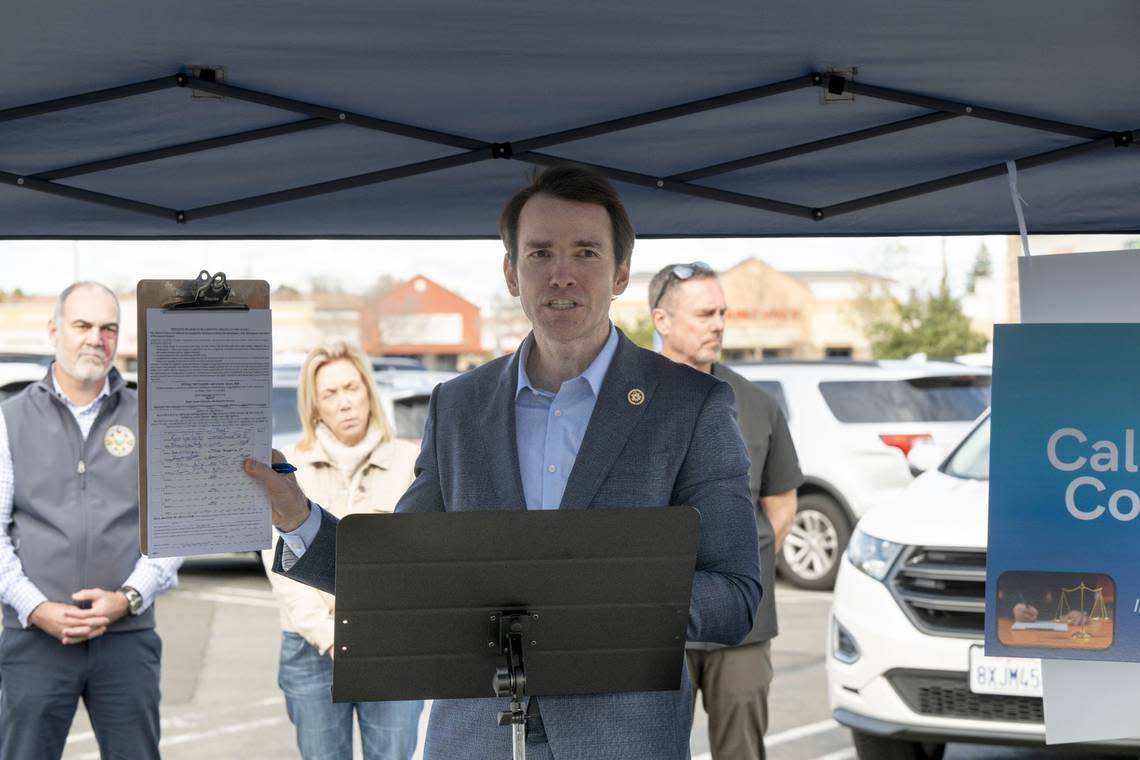California Democrats are paralyzed on sentencing reform. The clock is ticking | Opinion

- Oops!Something went wrong.Please try again later.
- Oops!Something went wrong.Please try again later.
Democrats in the California Legislature are running out of time to get their act together on sentencing reform or risk losing control of the issue to a public fed up with the state’s epidemic of retail theft. It’s everyday voters — not a handful of powerful politicians — who are likely to reform matters one way or the other.
The collective desires of legislative leadership and Gov. Gavin Newsom is to leave untouched a landmark sentencing reform law, Proposition 47 (passed a decade ago), which converted some nonviolent crimes such as petty theft and drug use into misdemeanors. But pretending that the issue isn’t coming back is looking more delusional by the day.
An initiative has qualified for the November ballot that could lead to increased jail sentencing for repeat shoplifters and chronic drug users. The most realistic way to get initiative backers to leave the measure off the ballot is if Democrats pass a compromise alternative.
But it seems Democrats simply don’t know what to do.
Opinion
Credit Sacramento’s Kevin McCarty, chairman of the Assembly Public Safety Committee, for helping to kill a really bad idea.
It appeared that Newsom and legislative leadership were looking to pass a package of crime reform legislation with language that would kill the entire package if voters in November were to pass the so-called Homelessness, Drug Addiction and Theft Reduction Act. But that was a wildly cynical idea to gain leverage that Newsom and legislative leadership simply never had.
Threatening a form of legislative suicide proved to be a self-inflicted wound, with legislative Republicans and pragmatic Democrats like McCarty wanting no part of such tactics.
So with poison pills now off the table, what’s left? The Democrats can try to quickly pass a series of modest reforms and then claim a November initiative is not necessary. A less risky path is a compromise initiative, but that would deeply split the Democrats in the California Legislature.
Prop. 47 made petty theft (stealing up to $950) a misdemeanor, a reasonable threshold. But this law also effectively allowed someone to go into a store and commit petty theft each and every day, with these crimes never adding up to anything more serious.
Defenders of Prop. 47 are loath to reopen the issue, fearing that stiffer sentencing would lead to mass incarcerations of poor Californians who are resorting to thievery to survive. So Democrats have been advancing different reforms they can tolerate.
McCarty, as an example, has a bill that would allow stores facing chronic theft problems to send their evidence directly to a county district attorney, bypassing police altogether.
But now that an initiative that would lead to more jail time for chronic shoplifters and drug users refusing treatment has qualified for the ballot, Democrats have no realistic way to avoid the voters. The Homelessness, Drug Addiction and Theft Reduction Ac is backed by district attorneys and businesses.
“I hope we can find a compromise,” McCarty said. He hopes to “make some strategic changes to Proposition 47 which will bring more accountability to offenders, but, conversely, won’t bring back mass incarceration in our state prison system.”
Initiative backers have until June 27 to withdraw their measure from the ballot. Without a meaningful alternative from the legislature, its changes to Prop. 47 are heading to the ballot.
McCarty thinks the initiative has gone too far on greater sentencing. Maybe Newsom can convince enough voters to reject it come November. But voters continue to see shoplifting with their own eyes as part of modern California life. And Newsom’s popularity is on the decline.
Only the voters can significantly change the sentencing guidelines in Prop. 47. It’s another example of the state’s legendary initiative process: Once voters take legislating into their own hands, they can keep control of the issue.
For the powerful Democrats in Sacramento, that’s one pill that’s hard to swallow. But that’s where we are. There is no possibility of intimidating district attorneys like Yolo County’s Jeff Reisig, a key backer of the qualified initiative. The only alternative is negotiation, compromise and pragmatism. Those words are like a foreign language these days in our halls of power.
The paralysis of the legislative Democrats reveals a party divided. It’s hard to identify appropriate consequences for crimes like shoplifting in ways that — hopefully — break the cycle of crime and incarceration and, instead, lead to better outcomes, such as drug treatment when theft is fueled by addiction. If the threat of stiffer sentences leads to rehabilitation rather than prison time, that is the kind of compromise that may work.
Now, Sacramento’s majority party are down to only a matter of days to advance something meaningful. For a party accustomed to getting its own way in town, it is in some unfamiliar territory.

